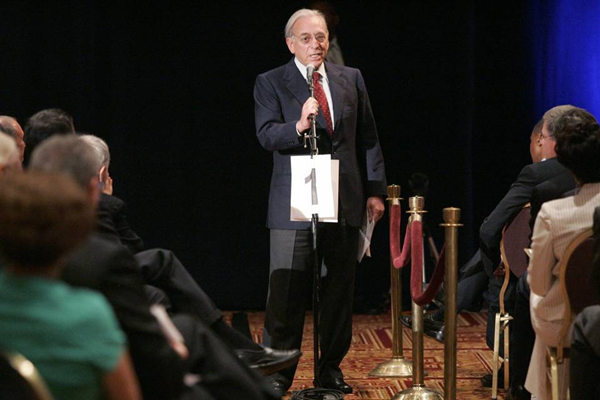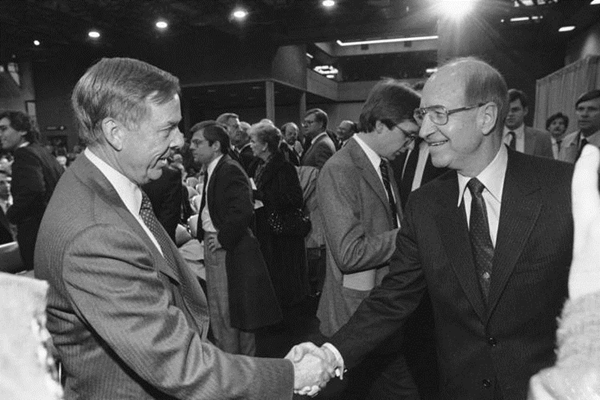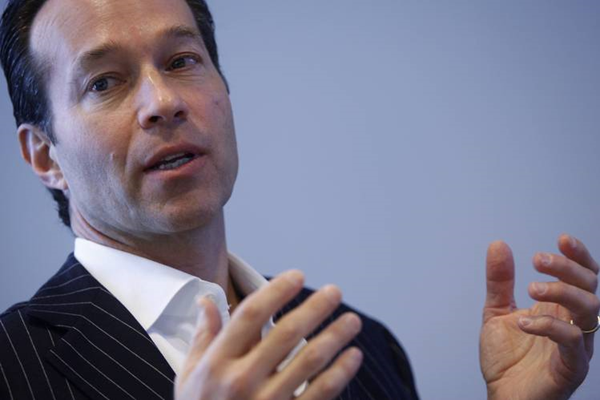|
THE
WALL STREET JOURNAL.
Business
Activism’s Long Road From Corporate Raiding to Banner Year
Change in tactics let industry move beyond controversial past
|

Activist investor Nelson Peltz addressed shareholders at the
H.J. Heinz annual meeting in 2006 after launching a proxy
contest. PHOTO: JASON COHN/REUTERS |
By
David Benoit
Updated Dec. 26, 2015 12:01
a.m. ET
When activist investor
Nelson Peltz demanded board seats
at
H.J. Heinz Co. in 2006, both the
company and its headquarters city were indignant.
The Pittsburgh newspaper
ran editorials urging support for the “hometown team.” Heinz gave
employees bottles of its signature ketchup with custom labels urging
them to vote against Mr. Peltz’s nominees. “We thought, ‘Gosh, we
don’t need outside help,’ ” recalls Art Winkleblack, then the
company’s chief financial officer.
This June, nearly a
decade later, Mr. Peltz’s Trian Fund Management LP got an entirely
different reception after buying a 7% stake in
Pentair
PLC, a Minnesota maker of pumps and valves. Pentair Chief Executive
Randall Hogan spoke several times with Trian co-founder Ed Garden
about corporate strategies and promptly moved to add Mr. Garden to its
board.
“You never know what you
don’t know,” Mr. Hogan says of his willingness to listen to the
activists.
After decades of being
treated as boorish gate-crashers, activist investors are infiltrating
the boardrooms of large companies like never before. This year
activists launched more campaigns in the U.S.—360 through Dec. 17—than
any other year on record, according to FactSet. They secured corporate
board seats in 127 of those campaigns, blowing past last year’s record
of 107. Activists now manage more than $120 billion in investor
capital, double what they had just three years ago, according to
researcher HFR.
The industry has come a
long way since the 1980s, when
Carl Icahn, Saul Steinberg,
T. Boone Pickens and other
mavericks would amass large stakes in companies and demand a sale of
the entire company. They were called “corporate raiders” and
“greenmailers” and were widely criticized.
These days activists,
while not exactly welcomed in corporate boardrooms, are rarely treated
as ill-mannered outsiders. “These activist funds are just a different
asset class who have the same pensions and endowments investing in
them as other funds,” says Rob Kindler, head of mergers and
acquisitions at
Morgan Stanley.
“The demonization of activists, when really what they are doing is
providing returns to the same pension and endowment plans, just seems
overdone.”
Several factors
contributed to this shift, according to corporate executives,
activists, bankers and lawyers. The financial crisis fanned
dissatisfaction with corporate executives and brought low interest
rates that helped activists thrive. Activists got more sophisticated
about analyzing target companies and built alliances with other big
shareholders, including mutual funds. And broad shifts in corporate
governance gave more power to all shareholders, including activists.
M&A lawyer Martin
Lipton, who for years has represented companies facing battles for
board seats, this year called on clients to consider settling with
some activists. “There is no timely way anymore for a company to be
slow about responding to a decline in performance or pursuit of the
strategy,” he noted in an interview.
This year, returns for
activist hedge funds averaged 3.4% through November, beating the
hedge-fund average of 0.3% and the S&P 500’s 3% total return,
according to industry research group HFR. Over the past five years,
activist funds have returned an annual average of 8.2%, compared with
the average hedge fund’s 3.2% return, HFR says.
The
debate about whether activism is good for
U.S. companies over the long term hasn’t gone away, most
recently popping up in the presidential campaign of
Hillary Clinton. She has
decried “hit-and-run” activists,
while also saying some activists help hold managers accountable.
Mr. Lipton has voiced
similar complaints. “Much of what is wrong with America today—slow
growth, widespread corporate scandals, inadequate investment in
long-term projects, low wages that have not kept pace with inflation,
wide swings in the economy accompanied by uncertain employment and
rising inequality—is attributable to short-termism and attacks, and
threats of attacks, by activist hedge funds,” he wrote recently.
Activist were a
different breed back in the late 1970s and 1980s. They made “midnight
raids” on stocks, building large, often controlling, stakes. Then they
pushed companies to sell themselves to the highest bidder or to the
raider himself, or to buy back their positions at above-market prices,
a practice known as greenmail.
When Mr. Pickens bought
stock in Gulf Oil Corp. in 1982, he was greeted by a lawsuit and spent
months trying to get a meeting with the Chief Executive James Lee. Mr.
Pickens contended the company was mismanaged, and he wanted to take
control.
Other shareholders were
suspicious. “One said ‘He’s a fast-buck artist,’ ” Mr. Pickens
recalled in a recent interview. “I said, ‘Who in the hell wants to be
a slow-buck artist?’ ”
The saga ended two years
later when the company later known as
Chevron Corp.
swooped in to buy Gulf for $13 billion, delivering Mr. Pickens a
substantial profit.
In 1984 alone, public
companies paid $3.5 billion in greenmail, with payments above market
price accounting for $600 million, according to a study by the
Securities and Exchange Commission.
Such tactics generally
outraged other investors and ensured that raiders remained on the
investment world’s fringe. In 1987, the Internal Revenue Service
introduced a tax of 50% on profits from greenmail, and several states
passed laws making it hard for companies to buy back stakes from
short-term investors at a premium.
By the 1990s, when a
bull market took hold, those practices had largely faded. Targeting
big companies was out of the reach for most activists because their
funds remained small. And with stocks booming, there was scant
investor demand for taking on prominent CEOs.
Activist Investor Report
Card
See what happened at large U.S.
companies targeted by activist investors.
The collapse of Enron
Corp. and WorldCom Inc. in the early 2000s led more shareholders to
question whether managers were acting in their best interests. It was
around that time that today’s activists started forming funds,
including what would become Starboard Value Fund and Barry
Rosenstein’s Jana Partners LLC.
Mr. Rosenstein, who once
worked for corporate raider Asher Edelman, launched his fund in 2001
but found few investors interested in targeting companies and
agitating for change.
“One person I pitched
said ‘This is not a strategy,’” Mr. Rosenstein recalls. “Nobody was
doing it.”
He raised about $20
million, opened shop with just three employees and started investing
in small companies, including
Herbalife Ltd., then a
lesser-known nutritional-shake maker, and York Group Inc., a casket
maker.
Mr. Rosenstein and his
fellow activists hoped to follow a path to respectability blazed by
private-equity funds, who had largely shed their image as buyout
“barbarians” and transformed themselves into respected, publicly
traded institutions. To do that, activists needed to persuade others,
including potential allies at mutual funds, they were interested in
building value at target companies, not just making a quick buck.
It was during this
period that Mr. Peltz launched his proxy fight at Heinz. When company
shareholders met to elect the board, the tension was thick. Mutual
fund Capital Research & Management Co., a large shareholder, voted for
some Trian nominees, stunning Heinz executives and helping put Mr.
Peltz and an ally on the board.
After winning the vote,
Trian didn’t push a quick sale, but
stayed around. Board members say
Trian helped focus the company on cutting certain costs and increased
spending on marketing, and sped up the company’s timetable for moves
that improved profit margins.
“They didn’t come in
with a sledgehammer saying you have to do it this way,” says Mr.
Winkleblack, then CFO.
|

Investor T. Boone Pickens, left, greeted Gulf Oil CEO James Lee
in 1983 after he bought stock in the company.
Photo: GENE J.
PUSKAR/ASSOCIATED PRESS |
“It was so seminal
because it was a huge company to go after at that time,” says Chris
Young, an activism-defense banker at
Credit Suisse Group AG. “It was
operational in nature, and you got mainstream, long-only investor
support. That, I think, started opening people’s minds to the art of
the possible.”
In 2013,
Heinz was sold to Brazilian
private-equity firm 3G Capital Partners LP and
Warren Buffett’s
Berkshire Hathaway Inc,
William Johnson, then Heinz’s
CEO, now is an adviser to Trian, and Mr. Winkleblack was a Trian board
nominee at
DuPont Co.
The financial crisis
that began in 2008 was a setback for many activists, who saw their
funds lose billions. But ultimately it created fertile conditions for
the current activism boom.
In the wake of the
crisis, many corporate executives took a more-conservative approach,
not wanting to be seen as risk-takers. They hoarded cash and avoided
big spending. When interest rates dropped, they borrowed money not for
expansion, but to buy back stock and increase dividends—exactly what
some activists were pushing for. Critics of such moves say companies
would be better off using capital on long-term investments such as
infrastructure, research and employees, but activists say managers
have proven poor spenders and shareholders can handle the money
better.
At the same time,
changes in corporate governance were making it easier for activists to
win board seats. Between 2011 to 2014, a group at Harvard University
led by professor Lucian Bebchuk campaigned to get more than 100 major
companies to put their entire boards up for annual election, instead
of staggering directors in multiyear terms.
Annual elections give
activists leverage because boards can be overturned in one fell swoop
rather than over a series of years. In 2000, 300 of the S&P 500
companies had staggered boards. This year, only 49 do.
|

Barry Rosenstein found few investors interested in activism when
he launched Jana Partners in 2001.
Photo: ERIC THAYER/REUTERS |
Perhaps the most
important change, according to both activists and their detractors, is
that activists got more sophisticated about analyzing how to improve
operations at target companies. They recruited executives with
experience in the relevant industries to work alongside them on
campaigns.
In 2012, for example,
William Ackman’s Pershing Square
Capital Management LP
launched a proxy fight against
Canadian Pacific Railway Ltd.
When Pershing Square called the former boss of rival
Canadian National Railway Co.,
Hunter Harrison, for advice, it found a willing partner. Pershing
Square campaigned with Mr. Harrison as its CEO candidate, eventually
winning seven board seats and
putting Mr. Harrison in charge.
Mr. Rosenstein’s Jana
Partners, which now employs more than 50 and runs more than $10
billion in assets, typically presents companies with several-step
plans about how they can cut costs, restructure their balance sheets,
shed assets and change strategy.
Last year, drugstore
chain
Walgreen Co.
agreed to put Mr.
Rosenstein on its board and
gave him a say in two other seats, all without a threat of a public
fight and a stake of only 1%.
Similarly, in 2013,
Microsoft Corp.
said it would
add a ValueAct Capital Management LP partner
to its board, even though ValueAct held a stake of just 1%.
Behind the scenes, ValueAct had support from some of Microsoft’s
biggest shareholders, including Franklin Templeton Investments and
Capital Research.
Trian has gained board seats, without a fight, at companies ranging
from fast-food chain
Wendy’s Co.
to
Bank of New York Mellon Corp.
This
year, it took
a stake in food distributor
Sysco Corp. and was given two
seats only a week after meeting management.
“They aren’t on a
search-and-destroy mission,” says Wesley von Schack, the lead director
of Bank of New York Mellon. “They come in and speak to the right
issues.”
Activist thinking now
appears to be influencing even executives who haven’t been targeted.
Executives now routinely talk about the return on every dollar spent—a
frequent focus of activists. Chief executives appointed this year by
McDonald’s Corp.
and
United Technologies Corp.
have
called themselves internal activists.
“We’re the activists at
UTC,” United Technologies CEO Gregory Hayes said in October. “If an
activist wants to come in and make a suggestion that we do it, we can
say, ‘Been there, done that.’ ”
General Electric Co. Chief
Executive
Jeffrey Immelt has gone so far as
to invite one activist to get involved in his company.
When GE announced in
April that it would shed GE Capital, its finance arm, Mr. Peltz, who
wasn’t an investor, called to congratulate Mr. Immelt.
“I’d love to have you in
the stock,” Mr. Immelt told Mr. Peltz.
As Trian did due
diligence, it urged Mr. Immelt and his team to eliminate more of GE
Capital than planned and to tap the debt markets for buybacks. GE
executives felt the activist was in the right ballpark. Trian
invested $2.5 billion, its
biggest investment ever.
A month after the stake
was disclosed, GE’s stock crossed $30 a share for the first time since
the financial crisis.
Write
to
David
Benoit at
david.benoit@wsj.com
|